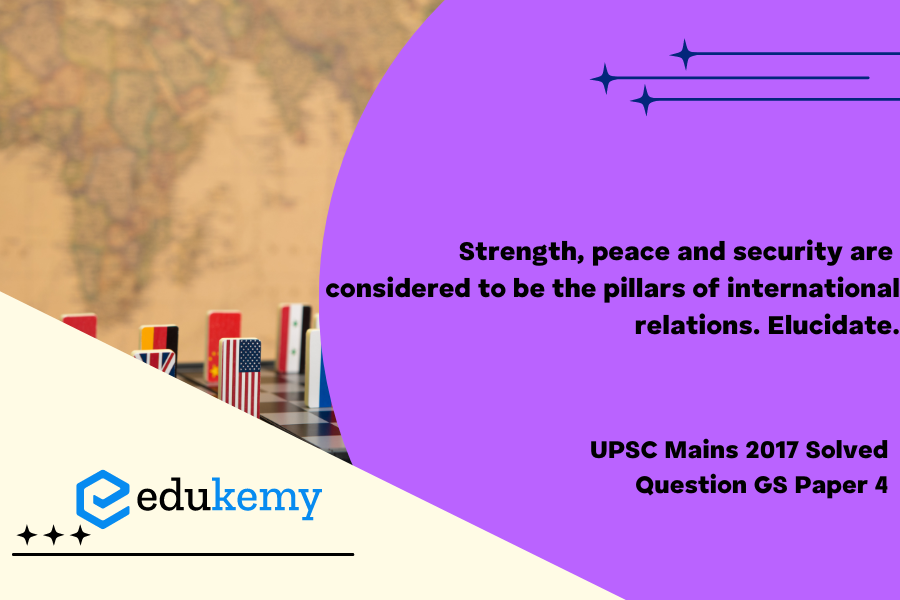Strength, peace, and security stand as the fundamental pillars shaping the landscape of international relations. Each pillar plays a pivotal role in maintaining equilibrium and fostering cooperation among nations. Strength, often rooted in economic, military, and technological prowess, empowers a nation to assert itself on the global stage, influencing diplomatic negotiations and alliances. Peace, on the other hand, serves as the bedrock for harmonious coexistence, encouraging dialogue and collaboration while mitigating the risk of conflict. Security completes this triad, encompassing not only military defense but also economic stability and protection against emerging threats such as cyber warfare and terrorism. Together, these pillars create a framework that underpins international relations, fostering a climate where nations can interact with confidence, resolve disputes through diplomacy, and collectively address global challenges. The interdependence of strength, peace, and security forms the basis for a world order that aspires to balance the interests of diverse nations and cultivate a shared vision for a stable and prosperous global community.
Tag: Ethical issues in international relations and funding.
Contents
Decoding the Question:
- In the Introduction, try to explain the context.
- In the Body, Discuss the three pillars of international relations.
- In Conclusion, try to mention the importance of these three pillars.
Answer:
The modern age has revolutionized our outlook and intent towards the other corners of the globe. In this revolutionized age, globalization and cyberspace has eradicated the barriers of distance, aptly shaping the contours of International relations. International relationships between countries are subjected to various conditions that ensure a mutually beneficial atmosphere is developed. Such conditions are strength, peace and security, which are sometimes considered pillars of international relations.

The three pillars of international relations:
Strength:
- It refers to robustness of relations between nations that comes from mutual trust. Trustworthy and reliable relations between nations are important while handling issues that cut across borders, affecting all or situations where a country is in crisis.
- For a country to leverage over global international affairs it needs to develop its strength both regionally as well as internationally. Strength will attract more allies and friends that will act as a pressure mechanism in the international platform.
- Lack of such strength erodes faith, breeds scepticism leading to paranoid or aggressive behavior. For example, the strength of relation between Israel and most nations surrounding it is missing leading to sour international relations.
Peace:
- Peace is a non-negotiable right for any nation that seeks a respectable coexistence. It fosters smooth relations between nations on economic, social and other fronts. Promotes creativity, collaboration and synergies between nations. For example, Industrial revolution in Europe conceded with relative peace prevailing in European countries
- Even if a country attains strength and power, it is seen as a propagator and supporter of international peace. All the efforts taken by the country for installing peace will be appreciated and will increase its influence leaps and bounds. Notion of peace at the bedrock of foreign policy will also help in attracting allies in the future.
Security:
- Security is a fundamental objective and mandate of every nation-state and in the process of achieving it and securing their men, material and maps, nations engage in diplomatic, military and economic means.
- A country must be secured from both external as well as internal threats for it to exercise its influence on global politics. A weak and insecure country is never considered as a possible ally and will be left behind in global politics.
- It is an assumed notion that nations have a right to use any means for their security and often these means degrade into self-serving selfish tools to serve vested interests which cause devious acts,destruction, and deaths. This has often been true whether in Nuclear bombing of Japan ,in Syrian proxy wars or in agent orange rain over Vietnam.
All three pillars are interdependent and hold foundations of International order in that without peace there is no strength (Yugoslavia) and without strength there is no security (Yemen) and without security there is no peace (Afghanistan). As an old saying goes “It is not just the fault of the wolf(external enemy) that it attacked the sheep(pacifist nation) ,it is also the fault of the nation which allowed its people to become sheep”.
In case you still have your doubts, contact us on 9811333901.
For UPSC Prelims Resources, Click here
For Daily Updates and Study Material:
Join our Telegram Channel – Edukemy for IAS
- 1. Learn through Videos – here
- 2. Be Exam Ready by Practicing Daily MCQs – here
- 3. Daily Newsletter – Get all your Current Affairs Covered – here
- 4. Mains Answer Writing Practice – here


